“Lemme show you some pictures… This guy has bought an INR 2 Cr flat in the Film City,” said the cab driver, as I looked distinctly disinterested in his multi-level marketing scheme.
The conversation happened way back in March 2016 when I travelled from Andheri East to Kharghar in Navi Mumbai.
“I am only requesting you to attend a session on Sunday,” the driver tried to convince me again. “I am sure you won’t be able to refuse the offer after that session. Nobody should disrespect the Goddess Lakshmi (money).”
On further inquiry, I found that he had little knowledge of cryptocurrencies or their legal implications. He just had a nodding acquaintance with MLM schemes and how they worked.
“It’s you who doesn’t know these things. Lakhs of people are involved in this scheme,” he argued.
That is not surprising, either. Scams of different shapes and sizes are frequently rolled out to cash in on the buzz of quick big returns around crypto. And the people who are easily lured are ill-informed buyers/investors caught up in the spiral of greed.
In the case of crypto scams, they are often rug-pulled into buying some sketchy digital tokens or other, often known as ‘shit coins’ due to their dubious origins. Yet, the victims rarely hesitate to take the plunge as these ‘promo’ sessions unveil the immense potential of the Ponzi schemes – huge incomes and lavish lifestyles. The wealth chant pushes countless dreamers to gamble their money away, overlooking legal concerns or investment safety.
In a conversation with GainBitcoin founder Amit Bhardwaj (now deceased), some investors asked whether their money was safe.
“Did anyone have any idea of what would happen to the biggest mobile companies like Nokia and BlackBerry?” he replied rhetorically.
GainBitcoin was just the beginning, though. Indians have fallen prey to dozens of crypto scams like Bitconnect, Morris Coin, Ether Trade Asia and more. For instance, if we take the below 12 crypto scams into account, the total amount that people lost in these scams is over INR 72,000 Cr. This is when we have taken the lower amount into the account, otherwise Bitconnect alone by some could cross INR 80,000 Cr. However, the data mentioned in our stories has been taken from chargesheets, and the corresponding investigatve agencies’ estimations.
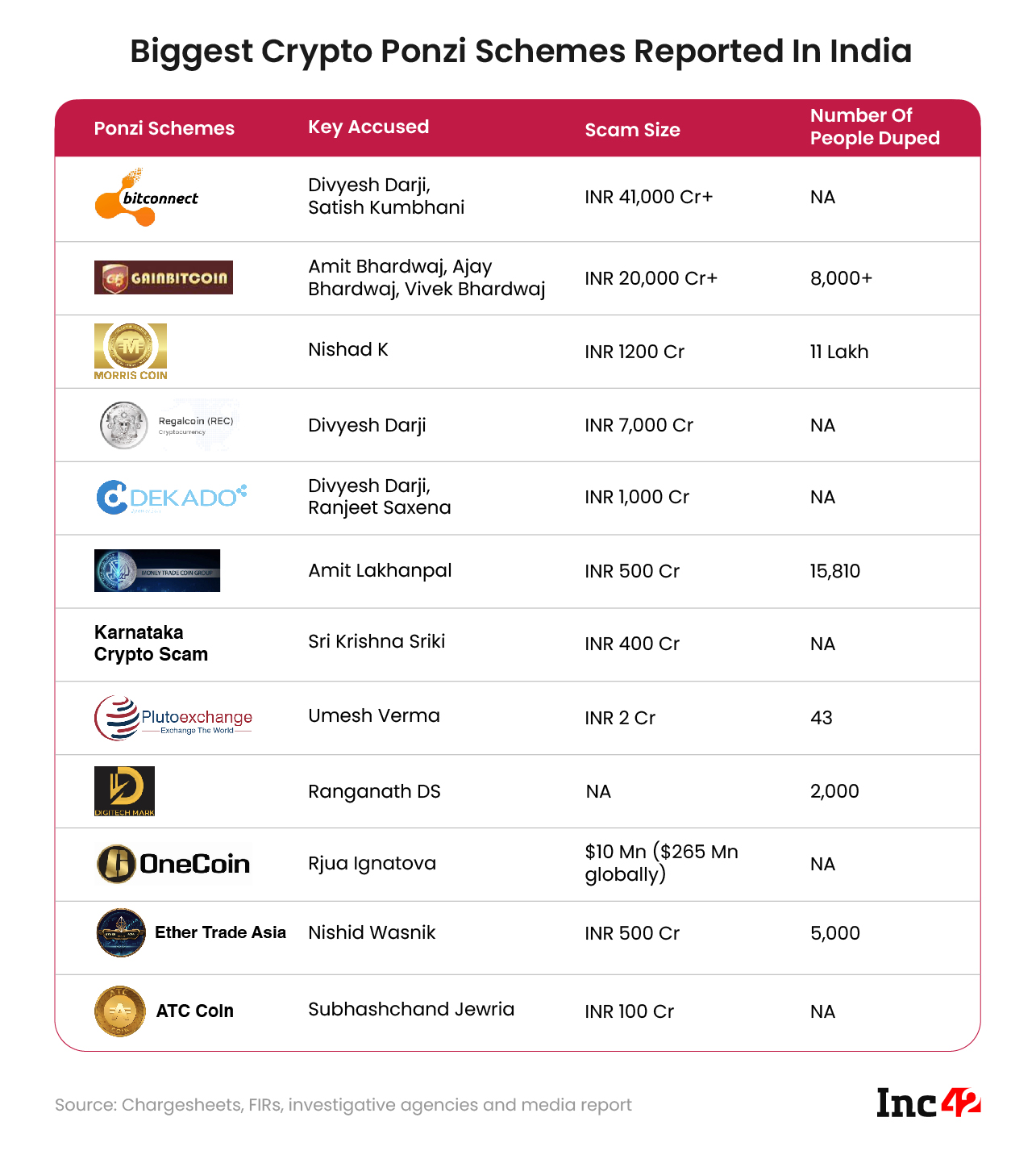
As per the details shared by a report by the Investor Education and Protection Fund Authority and the Indian Institute of Corporate Authority, more than 10 Cr Indians have been defrauded by top 15 pump-and-dump Ponzi schemes in the last three decades, leading to an average loss of INR 15.27 Lakhs per victim.
During the last three years, eight cases involving 84 companies have been assigned to Serious Fraud Investigation Office (SFIO), according to the minister of state of the ministry of statistics and planning, Rao Inderjit Singh’s response in Rajya Sabha.
Lately, crypto has become all the rage as a get-rich-soon investment solution, and scammers find it convenient to target the uninitiated with a variety of crypto Ponzi schemes.
Wary of the latest developments, fewer people are now visiting the scam websites/apps promising too much, too soon. The number of Indian visitors dipped drastically from 17.8 Mn in 2020 to 9.6 Mn in 2021, according to a Chainalysis report. The suspect websites most visited by Indian users in the past year included Coinpayu.com, adBTC.top, HackerTyper.net, Dualmine.com and Coingain.app. However, new names pop up every year with new hypes, casting more sophisticated scam nets far and wide.
Interestingly, none of the ongoing probes into major Indian crypto scams has neared a conclusion. Not even a mammoth scam like GainBitcoin that saw the filing of more than 33 FIRs at home and many overseas complaints from the US, the UK and Thailand. Clearly, the volume game does not drive the priority here.
But before we analyse what is slowing down the pace of investigation much like the proverbial Birbal ki khichdi (An undertaking that drifts on and on), here is a quick recap of some of the biggest crypto frauds that rocked India and their financial implications.
The GainBitcoin Scam: After Amit Bhardwaj’s Death, Can Investigators Bring Justice To Victims?
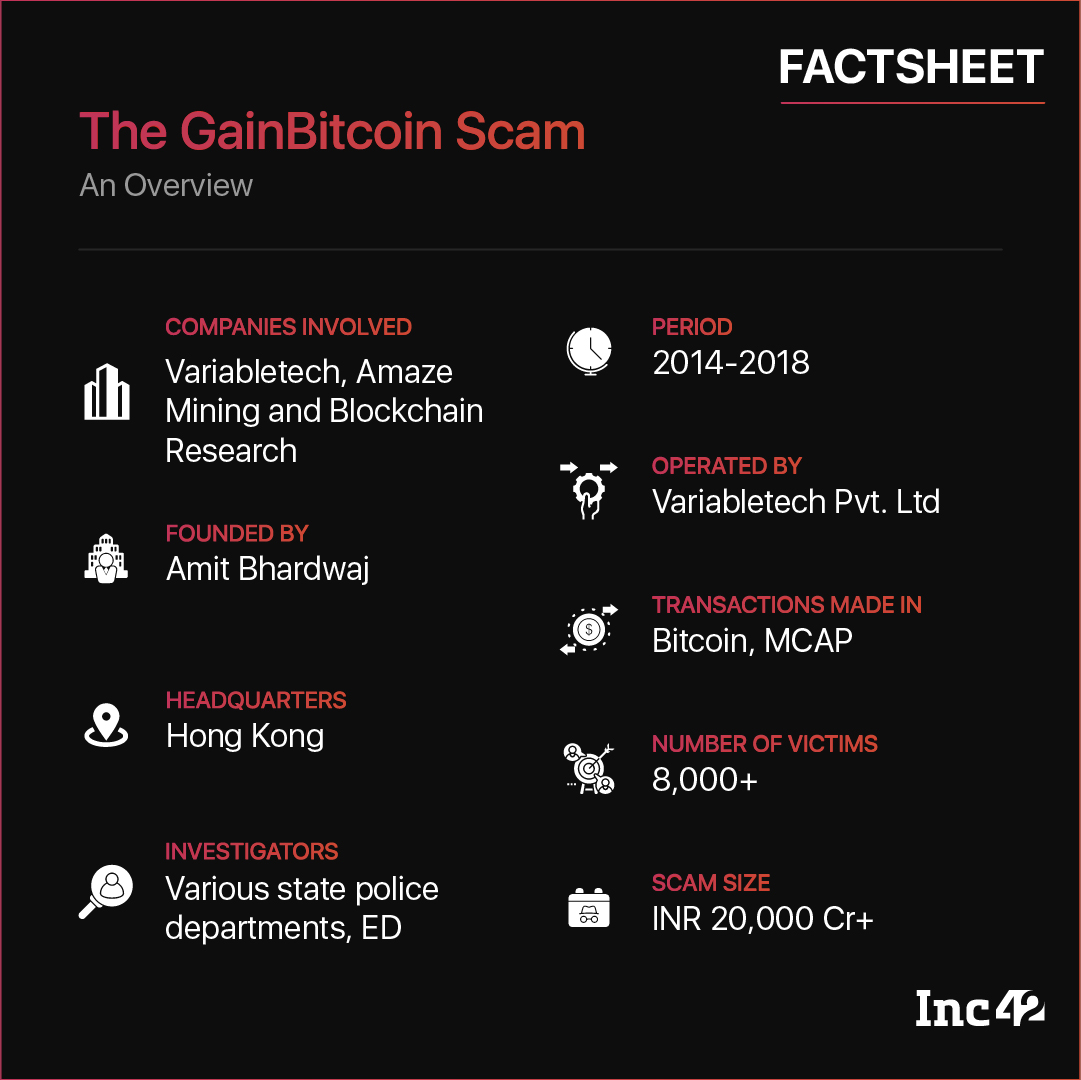
The Scam And The Mastermind: Once an Infosys employee, Amit Bhardwaj was one of the earliest entrants to the Indian crypto market. In 2013, he had set up Highkart.com, an ecommerce platform that allowed transactions in bitcoin. A year later, he launched Variabletech which used to run the infamous GainBitcoin scheme. Bhardwaj’s another company Norton Sales, headed by his brother Ajay Bhardwaj was also running crypto operations under GB Miners brand name.
GainBitcoin is considered one of the biggest Ponzi schemes globally, with more than 8,000 investors losing their money. According to people close to Amit Bhardwaj, what the Enforcement Directorate (ED) and the special investigation team (SIT) of Pune Police have unearthed is the tip of the iceberg.
Although Bhardwaj was under probe throughout the investigation and arrested in 2019 and was granted bail, a year later(he died of kidney failure in 2022), several FIRs named his brothers Ajay and Vivek Bhardwaj, his mother Bimla Devi, father Mahendra Kumar and sister-in-law Simpy Bhardwaj (Ajay’s wife).
The chargesheet filed by the Pune Police stated that Amit and his brother Vivek had set up Variabletech in Singapore in 2014. This firm launched a crypto exchange called BitEx and later came out with the GainBitcoin MLM scheme that offered bitcoin mining contracts. Under these contracts, investors were promised a 10% monthly return on every investment for 18 months, and the payout would be done in bitcoin.
As the MLM scheme flourished and more people came on board, it became increasingly difficult to pay every investor the promised 10% in bitcoin. Consequently, people started complaining about it on social media and other platforms.
Bhardwaj was prompt in resolving it. He changed the contract terms without notifying his investors and started paying them in pre-mined tokens called MCAP. These coins had negligible value and were not listed anywhere except on C-Cex, the crypto exchange owned by Bhardwaj. What’s more, his exchange did not even allow MCAP to bitcoin transactions, as demanded by investors.
Investors soon became aware of the rot and sought the help of law enforcement. As many as 33 FIRs have been registered in 11 states and Union Territories, including Maharashtra, Delhi, Chandigarh, West Bengal, Karnataka and more.
The Probe And Its Progress: The investigation was initiated by more than six state police departments of the Economic Offences Wing (EOW) and also by the Enforcement Directorate (ED) in 2019. A separate investigation by ED is looking at possible fraud angles by Bhardwaj and co.
While ED continues to summon Bhardwaj’s relatives and others allegedly involved in the scam, Pune Police recently arrested two cybersecurity experts, Pankaj Prakash Ghode (38) and ex-IPS Ravindranath Prabhakar Patil (45), for illegally transferring crypto assets worth INR 20 Cr to their own wallets which were recovered during the investigation.
Despite the demise of Amit Bhardwaj, the case is actively being probed by the Pune Police and the ED.
The Bitconnect Scam: A Scam That Involves Big Names
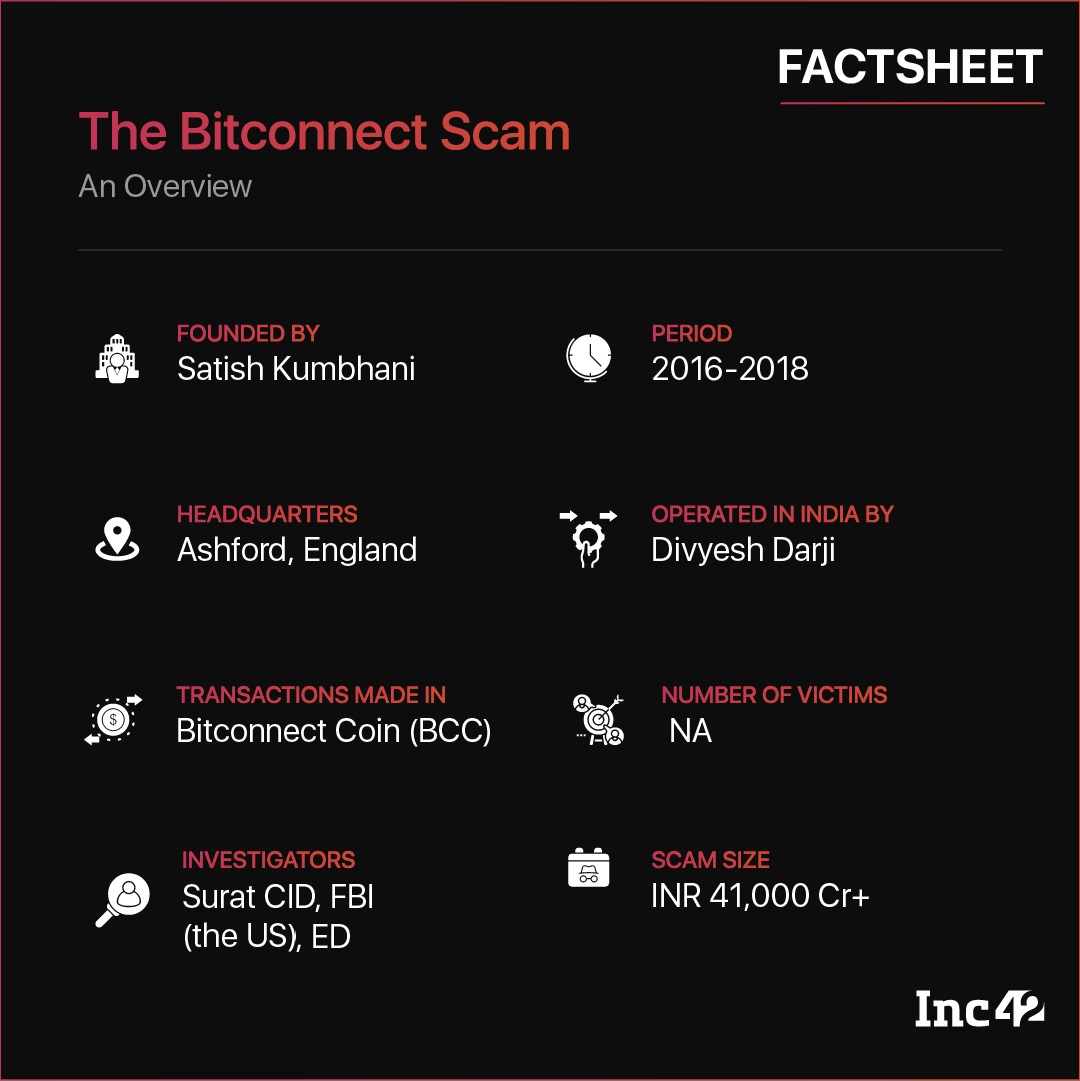
The Scam And The Mastermind: Like GainBitcoin, Bitconnect is considered one of the biggest crypto scams globally. The company was set up by Satish Kumbhani, and Divyesh Kumar Dhansukhlal Darji headed the Asia operations.
The scam size in the US alone was estimated to be INR 18,000 Cr ($2.4 Bn). According to the Surat CID team, which has been investigating the case in India, it is worth INR 41,000 Cr, out of which Darji got a 10% cut or INR 4,100 Cr. He had allegedly run two more copycat scams known as Dekado Coin and Regal Coin scams.
Similar to Amit Bhardwaj’s MCAP tokens, Bitconnect came out with BitConnect Coins (BCC) and marketed it as an investment option for traders. In this case, investors were supposed to earn daily interest of 1% while their RoI would double in 100 days. It was a more aggressive Ponzi scheme than what Bhardwaj sold under GainBitcoin.
The Probe And Its Progress: In February, 2022 the San Diego District Court indicted Bitconnect founder Satish Kumbhani for ‘orchestrating’ a global crypto Ponzi scheme. He was charged with conspiracy to commit wire fraud and price manipulation as well as operation of an unlicensed money transmitting business and conspiracy to commit international money laundering.
In India, Gujarat CID arrested Darji in August 2018. But he was granted bail by Gujarat High Court in May 2019. Other accused in the case are Satish Kumbhani, Dhaval Mavani and Suresh Gorasiya. In October, 2021, the ED attached 16.5 hectares of land worth INR 9 Cr belonging to Divyesh Darji. The properties were bought in the name of his family members, alleged ED.
While the Bitconnect scam is said to have been benefited from demonetisation immensely and many of the investors include IAS and IPS officers, and state ministers, and MLAs. However, unlike GainBitcoin investors, most of the Bitconnect investors chose not to file any complaint/FIR.
Regalcoin: Bitconnect Replica
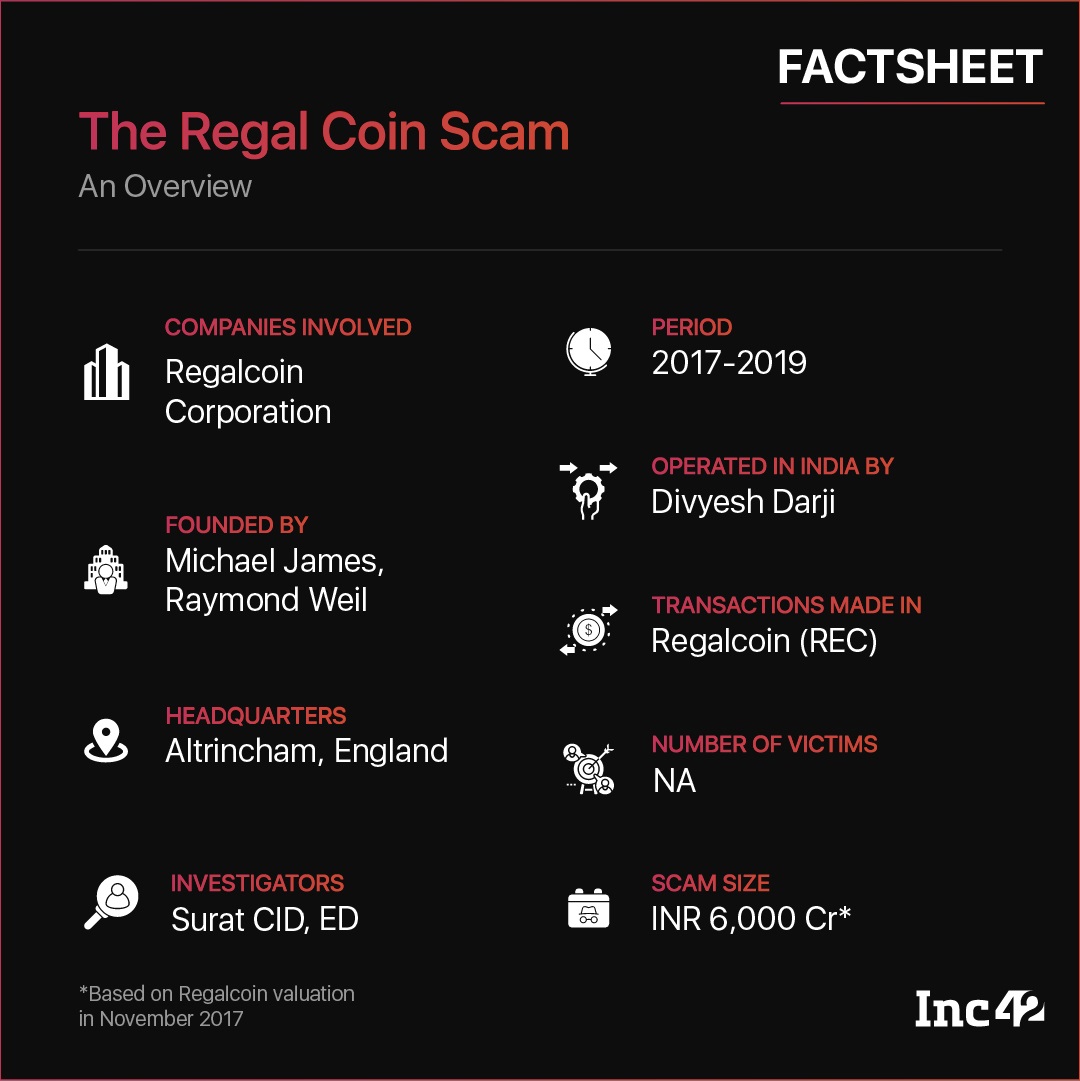
The Scam And The Mastermind: At the height of the Bitconnect fraud, Michael James and Raymond Weil launched a similar staking scheme, promising up to 50% monthly returns for holding its all-new token Regal Coin. The crypto was listed on a few exchanges, including CoinExchange.io, BTC-Alpha and Yobit.it, but its value nosedived from $70+ in October 2017 to $0.005 in 2019. According to its UK filings, Regalcoin Corporation, the company behind the coin, was dissolved in September 2019.
Darji of Bitconnect ran the operations in India under an MLM scheme called Regalcoin Affiliate & Network Programme, where investors used to get 7%, 2% and 1% at level 1, level 2 and 3, respectively. (Level 3 indicated minimum investment). Depending on the investment level, they earned a bonus of 5%, 3% and 2%, respectively. Like Bitconnect, the company had a lock-in period (99 days for Regal Coin), and a bot determined the interest rate on investments.
In the beginning, everything seemed to be in apple-pie order to many investors as the amounts corresponding to their names popped up on their dashboards after login. It also displayed the past three days’ returns on their investments and other relevant data.
But after a close look, experts found that there was no bot behind those investments; in fact, no trading was happening either.
According to Surat CID, in charge of the probe, Darji asked each investor to buy a Regalcoin at $2 and get $100 on each token in a short span. He also promised that the Regalcoin would earn better returns than the bitcoin, the poster boy of the crypto industry.
However, after the stipulated lock-in period, all investments started showing as zero or the investors could not withdraw their money. Later, the website was shut down under the pretext of an update.
The Probe And Its Progress: The Surat CID was investigating Darji for the Bitconnect scam when the Regalcoin scheme came to light. A Surat resident called Vishal Savalia approached the probe authorities, claiming that he had lost INR 17.5 Lakh in the Regalcoin. Darji’s daughter Dimki and his associates – Ramdayal Purohit and Mehul Pacchigar – were also accused.
Dekado Coin: Another Crypto MLM Scheme By Divyesh Darji And Team
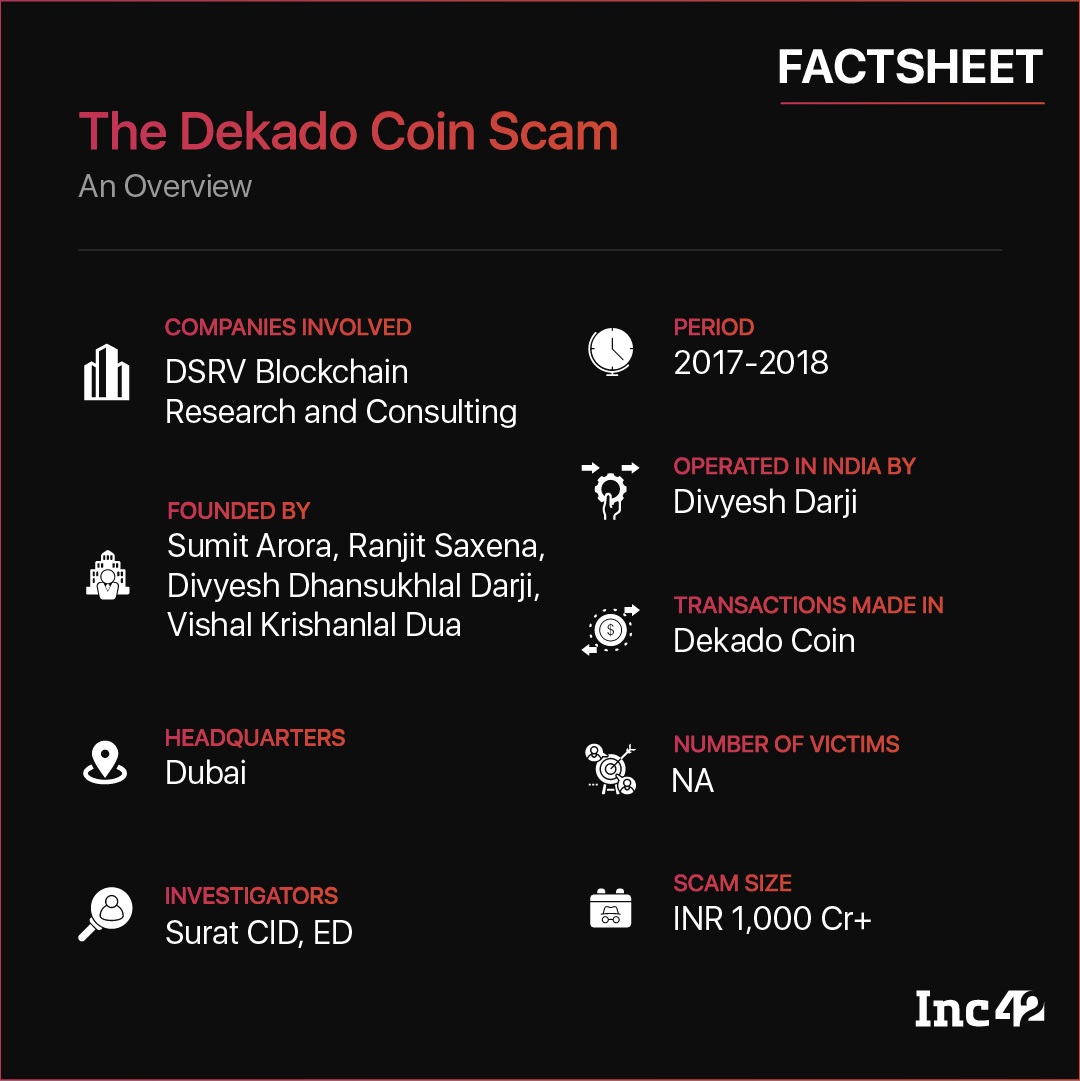
The Scam And The Mastermind: The Dekado Coin scam, masterminded by Divyesh Darji, Ranjeet Saxena and their partners, popped up with a catchy enough tagline: Anyone who says there is nothing like earning free bitcoin is wrong. In fact, Dekado was a unique case as it managed to scam people twice.
As usual, the introductory sessions promised 40-70% monthly returns on Dekado Coin. But when a global user base, especially from India, Indonesia, the Netherlands and the African continent, came on board soon after the launch, the website went down. People could no longer access their accounts on the website Dekado.io.
In April 2018, Darji and his team launched another website called Dkdpower2all.io, and Saxena, Darji’s partner, promised that the Dekado.io investors would get their crypto back. But that never happened.
The Probe And Its Progress: Since 2019, the state CID has been investigating the case based on the complaints filed by a few investors. However, all Dekado founders got bail and are currently absconding. Earlier, Darji and another accused, Dhaval Mavani, filed counter FIRs against the complainants, alleging that certain investors had been harassing them to return the money. Both Darji and Satish Kumbhani (the Bitconnect founder), the key accused in this case, have been absconding ever since. As a result, even the US Court has not been able to serve the order to Kumbhani.
Morris Coin: The Scam That Defrauded A Million
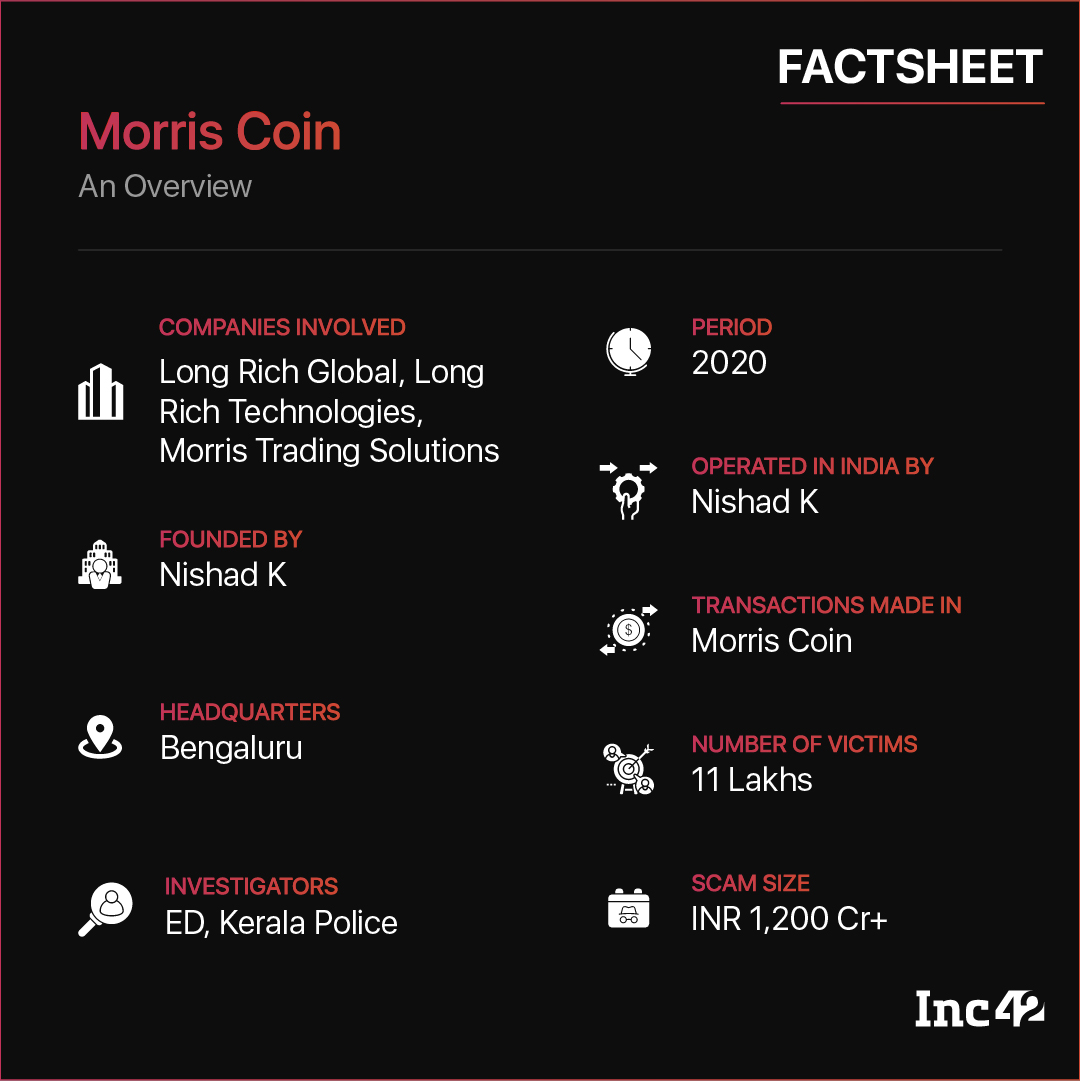
The Scam And The Mastermind: According to Kerala Police, EOW, Nishad K and his team collected a minimum of INR 15K from every investor and managed to onboard around 11 Lakh people, primarily from India. For every investment worth INR 15K, he had promised a daily return of INR 270 or 4.4x profit. Additionally, 10%-40% benefits were also promised for every successful referral.
However, the messy affair of Morris Coin ended bizarrely. Nishad K announced its ICO, and a white paper was published. But it was not listed on any exchange. Although the founder promised a blockchain-backed ICO, no blockchain ID was provided to track the fundraising. There was no customer support or other details apart from a lone email ID [email protected]
The Probe And Its Progress: The district police of Malappuram detained Nishad K in October 2020. But even before the Kerala Police could initiate a full investigation and arrest him, he was granted anticipatory bail by the Kerala High Court on October 21, 2020. The police failed to trace him after that, although seven people were arrested from Kannur, Kasargod and Malappuram in November 2021.
Meanwhile, based on the FIR registered by the Kerala Police, ED has also been investigating the case and attached Nishad K’s assets worth INR 36.7 Cr on January 10, 2022.
Ether Trade Asia Scam: Defrauding People In The Name Of Ether
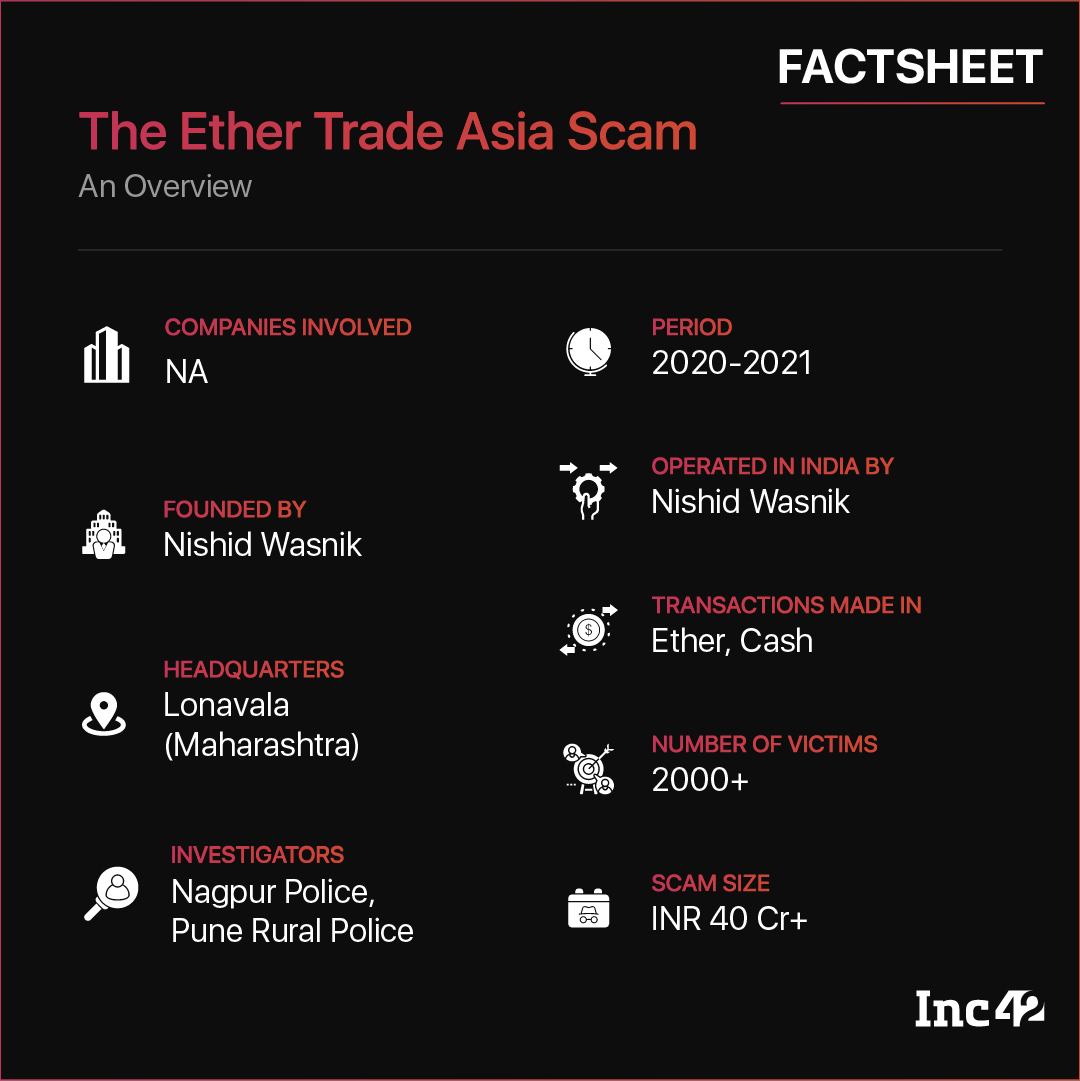
The Scam And The Mastermind: Like other scammers, Ether Trade Asia posed as a crypto trading platform, offering 3% daily returns on investments. But every time a trader wanted to withdraw their tokens, the platform did not allow it citing ‘technical glitches’. The website did not even publish any company’s physical address or an email ID for contact.
The Probe And Its Progress: In April 2021, the EOW of Nagpur Police and the Pune Rural Police jointly raided a hideout and arrested founder Nishid Wasnik, his wife Pragati Wasnik, Gajanan Mungune and Sandesh Landjewar.
The Probe Is On For Years; What About A Closure?
The major crypto scams discussed so far show how prevalent such incidents are and how they rob the consumer investment markets of billions of dollars. The absence of a pan-India watchdog/regulatory body scrutinising these digital assets and flashing the early warning lights also makes the country a hotbed of crypto scams. Add to that botched-up investigation in many cases, primarily due to these scams’ opaque and highly technical nature. The traditional enforcement agencies often lack the specialised knowledge and toolkit needed to slay these multi-headed digital scamsters who pop up repeatedly and lure unsuspecting customers into investing in sketchy tokens launched without industry due diligence.
But there is another side of the coin. India also requires a digital-age-ready judicial system that can speed up the procedure and take early cognisance of tech-powered financial irregularities to mitigate investors’ risks. Speed is of the essence here, and moving away from the traditional judiciary practices will give investigators more teeth while procedural rules and delays clip their wings.
“Some of the key accused in these cases got anticipatory bail (which may hinder investigation). In other cases where chargesheets have been filed, the accused are absconding. They got away after being granted bail,” said a Mumbai Police official earlier investigating one of the cases.
Seconding that a Surat police officer said, “The biggest issue that we faced is that victims do want their money but they are not ready to fight. Many of these investors had invested cash in these scams, right after the demonetisation move by the government. These investors are not ready to share the entire details but just want their money back.”
As documented by veteran journalist Arun Shourie in his books Anita Gets Bail: What Are Our Courts Doing and Courts and Their Judgments, the Indian judiciary, modelled after the British legal system and traditions in practice way before the Independence, is flawed, and this malaise is contagious. It was never built to address the concerns of one-sixth of the world’s population, claimed Shourie. Of course, the judiciary is a sturdy dyke that protects people from excesses. But the procedure has not changed even when dealing with high-tech cases of financial fraud like the crypto scams cited here.
After speaking to probe agencies, lawyers and the victims, we have zeroed in on three significant drawbacks that delay the investigation.
First, the country’s investigating agencies, including ED and the Narcotics Control Bureau (NCB), are not adequately equipped to decode such cases.
Second, in scrupulously following all procedural guidelines, the existing system tends to overlook the plight of the victims.
Third, some of these people like Amit Bhardwaj, Ranjeet Saxena and Divyesh Darji have been involved in multiple scams. However, the investigative agencies have not widened the scope of their investigation. For instance, Pune Police who are investigating the GainBitcoin scam have not been investigating Bitconnect and similar is the case with Surat CID.
Here is a case in point. The Gujarat CID (and later ED) has been investigating the Bitconnect case since 2018, while the U.S. probe agency FBI came in a year later. However, a U.S. District Court (San Diego) has already indicted Bitconnect founder Kumbhnani, while its India head, Divyesh Darji, is still on the run after receiving bail. Also, the US is now working on dissolving the assets of Bitconnect (US) to compensate the investors. But in India, the investigative agencies are still way behind.
Similarly, after the reported death of Gerald Cotten, the founder of QuadrigaCX, Canada’s largest exchange at the time, $190 Mn of investors’ money went missing. (Cotten mysteriously died in 2018, at the age of 30.) The Nova Scotia Supreme Court declared the company bankrupt and selected the accounting firm, Ernst & Young, to serve as its third-party monitor, responsible for securing the lost funds belonging to Quadriga’s creditors.
In India, whether it’s ED or state police, all these investigations have been so far focusing on proving whether the accused has done the crime and not on the injustice done to the victims.
Will the Indian judiciary take note of such proactive measures to ensure justice is not denied to crypto scam victims?

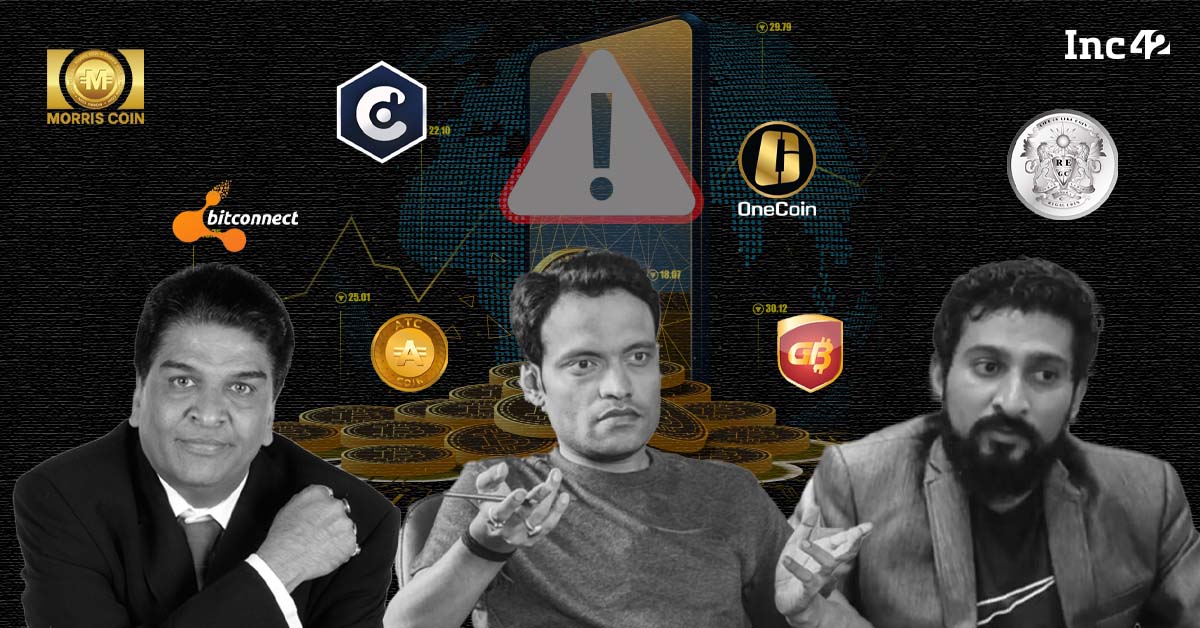






![Read more about the article [Funding alert] Fashion retailer High Street Essentials raises Rs 25.50 Cr from existing investors](https://blog.digitalsevaa.com/wp-content/uploads/2021/05/Imager26e-1592803473565-300x150.jpg)

